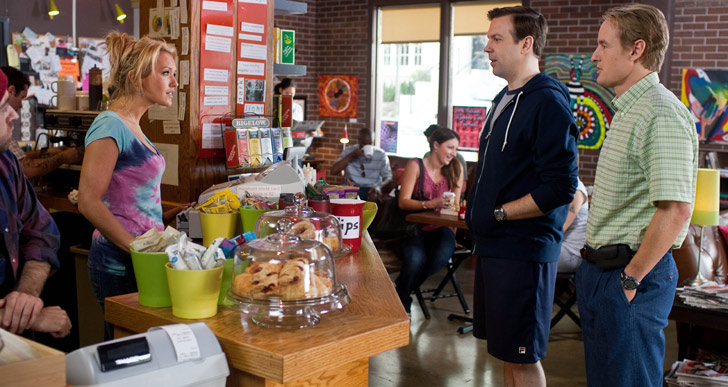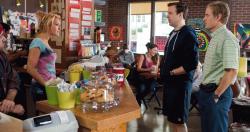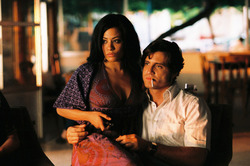Rape-revenge is the basest of movie formulas. What amounts to a social contract exists with the audience: during the first half of the film, you will experience the sadistic, brutal, misogynistic sexual abuse of an innocent, probably naïve young woman at the hands of cavalier thugs. And during the second half of the film, you will see this broken woman--this survivor--pull herself together long enough to exact a terrible revenge on those who wronged her.
Originally reviewed 05/16/08
As this Hammer horror melodrama from 1972 opens, schoolteacher Albert Mueller (Laurence Payne) catches his wife (Domini Blythe) and one of the young village girls making their way through the countryside in what's apparently a quite unwholesome direction. He follows, but is unable to prevent their entry to the castle of Count Mitterhaus, a notoriously sexy vampire who holds the whole village under his sway. As the cuckold tries to marshal the shiftless men of the village for a rescue mission -- experience with the Count seems to have whipped everybody here into a sense of meek helplessness -- his wife offers up the young blond virgin to the vampire, who rips the girl's throat out. The woman tears her own clothes off and Mitterhaus makes love to her. When the villagers are finally coerced to make their way to the castle with torches and grim looks, they carry away the dead girl and do battle with Mitterhaus himself, who ends up impaled through the chest on a pointed wooden stick while cursing the village in a stage whisper. Albert's wife is brought outside and whipped as punishment for her betrayal, but finally runs back into the castle, which is set afire and burns into ruins. And then the opening credits roll.
An opinion piece in The Daily Beast ignited a half-baked controversy in the blogosphere last October by taking The Social Network's screenwriter, Aaron Sorkin, to task. Writer Rebecca Davis O'Brien perceived the film as misogynist — or sexist, or something — complaining about the absence of strong female characters in the film. On that count, she is largely correct. The Social Network is about a group of young men inventing something that became fundamental to how people communicate online. But is that, by itself, indicative of some kind of unfairness toward women?
This prototypical film noir, which saw rookie director John Huston adapting Dashiell Hammett's only Sam Spade detective novel, was the last movie I watched in 2010. Warner Home Video's recently released Blu-ray version had been calling to me from the depths of my to-watch stack, and anyway it's always been one of my favorite movies — immaculately designed, evocatively photographed, and easy to watch but also spiky, morally complex, and ultimately unsettling. Humphrey Bogart is so beloved a figure in American film history that it always catches me a little off-guard to realize that the superficially charming character he's portraying here isn't the dedicated moral crusader that convention might lead one to suspect. Arguably, he's rather a glad-handing sociopath.
Neither especially well-crafted nor completely inept, Death of a Snowman is less interesting as a film than as an artifact. You might hope that a low-budget crime drama shot in and around Johannesburg, South Africa, during the apartheid years would deal explicitly with political conditions in the segregated country. Instead — perhaps because of government censorship or fears of political reprisals — Death of a Snowman has only the whiff of racial tension about it, as whites and blacks doubt, disbelieve and double-cross one another from start to finish.
In Black Swan, Natalie Portman plays a prima ballerina with problems. She’s just been entrusted with a role she has no idea how to play. She lives with her mother, a bitter and broken-down control freak who comes on like Piper Laurie in Carrie. She’s scorned by her role model. She sees visions of her doppelgänger in mirrors, in construction walkways, and even in the bathroom. It’s possible that she’s growing wings. She may have an imaginary friend. She may be a virgin. She needs to get laid.

This merry band of clowns, physical comedians each and every one, may have peaked with the outrageous, hilarious Jackass Number Two, the first installment in the popular TV/DVD/theatrical franchise to reckon with Father Time. The boys are even older here, of course, but Jackass 3D doesn’t feel quite as candid or revealing as the previous installment. Instead, it goes straight for the gross-out — I don’t recall Jackass ever being so fixated on bodily secretions and excretions as it is here. (They shit! They sweat! They piss! On each other!)

Clint Eastwood doesn’t overthink his material. He grabs a screenplay he likes and starts shooting. Writer Peter Morgan said he was quite surprised that Eastwood started filming Hereafter without demanding rewrites, or even discussing the script much, and the resulting film has an obvious first-draft quality. It doesn’t really work.

Note: Certified Copy screens October 1 and October 3 as part of the New York Film Festival.
Certified Copy, which opens on a lecture consigning the concept of originality in art to the Academy of the Overrated, is an awesomely playful intellectual romance (or is it a farce?) from the great Iranian director Abbas Kiarostami. When I say playful, I mean confounding in the manner of Last Year at Marienbad, which basically dared viewers to say which competing, contradictory story threads represented real events in the film’s world. I mean bewildering in the style of Bunuel’s That Obscure Object of Desire, which had two different actresses playing a single character. And when I say that, what I really mean is that it’s a bracingly reflexive exercise that flouts basic rules of narrative cinema and manages to come out ahead of the game.

Confession: my only previous exposure to Apichatpong Weerasethakul, the Thai director who's one of the most lauded auteurs currently working, was a DVD copy of Tropical Malady, which frankly bored my pants off. Watching Uncle Boonmee Who Can Recall His Past Lives on the big screen at the New York Film Festival's Alice Tully Hall, it occurred to me almost immediately that waiting to see anything by Weerasethakul on DVD is a terrible idea. For Uncle Boonmee, the large theater screen works like a window onto a bigger world populated by larger-than-actual-size memories and myths. And the photography is not the kind of crisp, high-contrast work that translates well to home video (though Blu-ray might do OK by it) — shots taken within the Thai jungle, for instance, are unfailingly dense and moody, with different and ever-darker shades of green layered on top of each other like thick brush strokes in an oil painting. Sometimes it feels as if the whole film were shot at twilight, or using day-for-night shooting and processing trickery. When one of Weerasethakul's rare bright daylight exteriors hits the screen, you feel it like waking up at noon.

Throughout most of film history, it would have been inconceivable to mount a 95-minute mainstream film that took place entirely within the confines of a wooden coffin buried several feet underground. All hail the cell phone – with one of those gadgets helpfully stashed near his person, Ryan Reynolds is a one-man suspense movie. In Buried, an English-language film from Spanish director Rodrigo Cortes and writer Chris Sparling, he plays Paul Conroy, an American contractor who drove supply trucks across the Iraq desert until his convoy was ambushed by insurgents. He wakes up in a pine box – a fairly roomy one, actually – equipped with said phone and a few temperamental sources of light.

Whatever else its merits may be, Gaspar Noe's Enter the Void immediately enters the canon of first-person cinema. The highly subjective camera that depicts an experience from the point of view of one of the characters in a film has been a source of fascination and frustration in cinema for decades. Executed well, and in short bursts, it can be an effective tactic. For instance, there's a memorable sequence in Carl-Theodor Dreyer's Vampyr (1932) in which the camera seems to be placed inside a coffin and then carried through the streets. But 1947's The Lady in the Lake, a feature-length film noir shot entirely with a subjective camera, is an oft-discussed but somewhat goofy curio that is seldom actually dragged out into the light of day.

The Boston neighborhood of Charlestown, a series of pre-title cards inform us, is a fundamentally miserable but also beloved place, a rough-and-tumble environment where bank robbery has become a cottage industry. The Town is the story of bank robbers, and of the dilemma experienced by the people — Townies, they're called, affectionately and not-so — who dwell in a place they love, and from which they're desperate to escape.
 Easy A is a pleasant enough high-school movie, and it's certainly a sign of bigger things to come for the terrific Emma Stone, who tucks the whole film under her arm and runs with it. Stone plays the kind of teenaged girl who's as bright and hot as the noonday sun but is still a wallflower at her high school. In other words, she's a work of fiction – and one who starts getting noticed by her classmates only when she gains a reputation as a loose woman, displaying a red letter A on her chest.
Easy A is a pleasant enough high-school movie, and it's certainly a sign of bigger things to come for the terrific Emma Stone, who tucks the whole film under her arm and runs with it. Stone plays the kind of teenaged girl who's as bright and hot as the noonday sun but is still a wallflower at her high school. In other words, she's a work of fiction – and one who starts getting noticed by her classmates only when she gains a reputation as a loose woman, displaying a red letter A on her chest.
 Scott Pilgrim vs. the World is an exotic multiplex confection – a romantic comedy with elements of its visual grammar swiped from comic books and videogames. It's tempting to say that people who are sick of conventional Hollywood love stories will find a bracing alternative here but, unfortunately, Scott Pilgrim isn't much of a love story, unless the affair you're interested in is the one between a boy and his cultural totems. If that's the case, Scott Pilgrim vs. the World should be hugely entertaining. It's a visual knock-out with the sensibility of a pinball machine, caroming from one set piece to the next, turning on lights and spinning little flippy things and ringing bells. It's not Speed Racer – it remains genuinely character-focused and never aims to overwhelm. But it's playful, borrowing concepts like power-ups and extra lives from the RPGs and adventure games that have made them an intuitive part of a certain kind of narrative grammar for a generation.
Scott Pilgrim vs. the World is an exotic multiplex confection – a romantic comedy with elements of its visual grammar swiped from comic books and videogames. It's tempting to say that people who are sick of conventional Hollywood love stories will find a bracing alternative here but, unfortunately, Scott Pilgrim isn't much of a love story, unless the affair you're interested in is the one between a boy and his cultural totems. If that's the case, Scott Pilgrim vs. the World should be hugely entertaining. It's a visual knock-out with the sensibility of a pinball machine, caroming from one set piece to the next, turning on lights and spinning little flippy things and ringing bells. It's not Speed Racer – it remains genuinely character-focused and never aims to overwhelm. But it's playful, borrowing concepts like power-ups and extra lives from the RPGs and adventure games that have made them an intuitive part of a certain kind of narrative grammar for a generation.
 Perhaps funded and distributed on the promise of Christina Ricci in her skivvies and less, After.Life is weirdly compelling for such a marginal movie. Its premise is a little coy, toying with the expectations of audiences that have had their fill, lately, of stories with characters caught in some strange limbo between living and dying where they work out the psychological issues that hectored them in the real world.
Perhaps funded and distributed on the promise of Christina Ricci in her skivvies and less, After.Life is weirdly compelling for such a marginal movie. Its premise is a little coy, toying with the expectations of audiences that have had their fill, lately, of stories with characters caught in some strange limbo between living and dying where they work out the psychological issues that hectored them in the real world.
When Django, the title character and hero of director Sergio Corbucci's seminal spaghetti western, first appears on screen, he's slogging on foot through mud, dragging a coffin behind him. The image is evocative and challenging. In classic American films, western heroes had generally been dignified cowboy types saddled up on strong horses. They were lawmen or simple ranchers with a code of honor. They rode into town in a cloud of dust and plainspoken righteousness backed up by a sharp eye and a six-shooter, and they stood for the endurance of traditional values on a wild frontier.
Django thinks those guys were pussies.
Read the full review at FilmFreakCentral.
 Count me among the great admirers of Todd Solondz’ Happiness. Some viewers complained that Solondz mocked his characters, but I never got that. As far as I could see, that was his achievement. Without passing judgment, he investigated the failures of some of the least among us -- the failed songwriter, the unlucky in love -- and dug out the humanity among the worst of us -- the obscene phone caller, the pedophile. The result was an uneasy mix of tone. It wasn’t quite comedy and it wasn’t quite melodrama. You weren’t sure whether to be amused or appalled, and the fact that Solondz could elicit a horrified titter of recognition at some of the most base material showed that he kept the human in human behavior.
Count me among the great admirers of Todd Solondz’ Happiness. Some viewers complained that Solondz mocked his characters, but I never got that. As far as I could see, that was his achievement. Without passing judgment, he investigated the failures of some of the least among us -- the failed songwriter, the unlucky in love -- and dug out the humanity among the worst of us -- the obscene phone caller, the pedophile. The result was an uneasy mix of tone. It wasn’t quite comedy and it wasn’t quite melodrama. You weren’t sure whether to be amused or appalled, and the fact that Solondz could elicit a horrified titter of recognition at some of the most base material showed that he kept the human in human behavior.


















